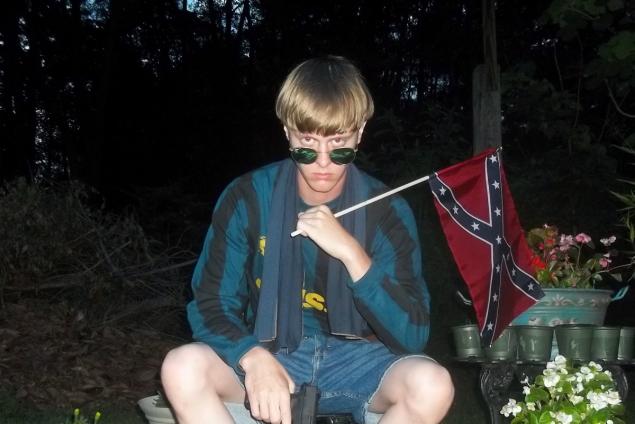 The journal was the centerpiece of prosecutors’ opening bid to convince jurors that Roof, 22, deserves the death penalty for slaying nine black parishioners of the city’s historic Mother Emanuel African Methodist Episcopal Church in 2015. Roof, 22, was convicted last month of federal hate crimes for the shooting, and the same jurors who declared him guilty must weigh whether he deserves life in prison, or execution.
The journal was the centerpiece of prosecutors’ opening bid to convince jurors that Roof, 22, deserves the death penalty for slaying nine black parishioners of the city’s historic Mother Emanuel African Methodist Episcopal Church in 2015. Roof, 22, was convicted last month of federal hate crimes for the shooting, and the same jurors who declared him guilty must weigh whether he deserves life in prison, or execution.
[‘Evil, evil, evil as can be’: Emotional testimony as Dylann Roof trial begins]
For his part, Roof did nothing to rebut prosecutors’ assertions about his lack of remorse. He used a brief opening statement only to tell jurors that he had fired his lawyers because he did not want them to present evidence about his mental health. He complained that the lawyers, outside of the view of the jury, “forced me to go through two competency hearings,” which he said would eventually become part of the public record.
“So, in that respect, my self-representation accomplishes nothing, so you can say, what’s the point?” Roof said. “And the point is that I’m not going to lie to you, either by myself or through anyone else.”
“There’s nothing wrong with me psychologically,” he added later.
Assistant U.S. Attorney Nathan Williams said that Roof’s crimes were awful enough to deserve the ultimate penalty. Roof killed not one person, but nine, and “he killed them because of the color of their skin,” Williams said. He researched and scouted the church full of innocent people, whom he targeted for their vulnerability and “to magnify and incite violence in others,” Williams said.
And even six weeks after the massacre was over, Williams said, Roof wrote about his racial hatred and desire to spark mayhem in a journal investigators took from his jail cell. He said he sometimes lamented the loss of some of the things he enjoyed doing while free, but remarked, “Then I remember how I felt when I did these things, when I committed these murders, and how I knew I had to do something. And then I realized it was worth it.”
Jurors on Tuesday also heard firsthand from a survivor of the attack: Jennifer Pinckney, who listened from another room in the church while Roof executed her husband, the Rev. Clementa C. Pinckney, and the others.
Pinckney said she urged her daughter to be quiet, so they, too, would not be killed, and when she went to retrieve her phone, she told the young girl: “Regardless of what happens to Mommy, you stay under this desk.” Earlier, she said, she had heard Roof say, “I’m not crazy, I had to do this,” and what sounded like him attempting to open the locked door.
“I was just like, ‘This is it, this is it,’ ” Pinckney said.
As Pinckney testified, Roof sat motionless — looking downward or straight ahead. Given an opportunity to question her himself, Roof said, “No questions.”
Roof did not contest his guilt in the case. Jurors saw a video of him matter-of-factly confessing to the crime in an interview with FBI agents and even chuckling at times.
“I am guilty,” he said. “We all know I’m guilty.”
In the same interview, though, Roof said that he regretted the crime “a little bit” and that the fact that nine people were killed “makes me feel bad.” Jurors took less than two hours to find him guilty of all 33 counts they were asked to consider.
Even some involved in the investigation and prosecution — including William Nettles, the former U.S. attorney in South Carolina, and Vanita Gupta, the head of the Justice Department’s civil rights division — advised against Attorney General Loretta Lynch’s decision to seek Roof’s execution. The Mother Emanuel church opposes the death penalty on religious grounds, and victims’ family members and those representing them have expressed complicated views on the subject.
Asked in his interview with FBI agents what he thought should happen to him, Roof responded, “I don’t know how to answer that.” But asked what should happen to a black man who killed nine white people in a church, Roof said: “He should probably die, too, I guess.”
Andrew J. Savage III, who represents several survivors of the attack and family members of those slain, said many — though not all — of his clients initially opposed the death penalty. They included Felicia Sanders, who was there during the shooting and whose son, Tywanza Sanders, 26, was killed.
“She wanted him to live so he could think about what he did and recall her son’s statement during the shooting, which was, ‘We mean you no harm,’ ” Savage said.
But Savage said Sanders’s and others’ views have evolved, especially since they saw Roof’s videotaped confession. Sanders, he said, is not a supporter of the death penalty, but she feels “that government has its responsibilities that she does not control.”
Federal death sentences are a rarity, and actual executions even more so. The Justice Department has executed only three inmates in the modern death penalty era, and the last such execution was in 2003.
In some ways, Savage said, there is no good outcome for the victims’ loved ones. If Roof is sentenced to death, Savage said, the families will have to endure years of appeals. If he isn’t, they will still have to wrestle with an upcoming state trial, where a jury could impose a death sentence.
“The thing that they probably won’t get, and the thing that I want the most for them, is some form of closure,” Savage said. “The closure is not coming.”


